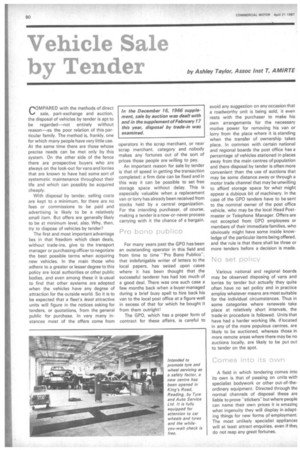Vehicle Sale
Page 82

If you've noticed an error in this article please click here to report it so we can fix it.
by Tender by Ashley Taylor, Assoc lnst T, AMIRTE COMPARED with the methods of direct sale, part-exchange and auction, the disposal of vehicles by tender is apt to be regarded—not entirely without reason—as the poor relation of this particular family. The method is, frankly, one for which many people have very little use. At the same time there are those whose precise needs can be met only by this system. On the other side of the fence there are prospective buyers who are always on the look-out for vans and lorries that are known to have had some sort of systematic maintenance throughout their life and which can possibly be acquired cheaply.
With disposal by tender, selling costs are kept to a minimum, for there are no fees or commissions to be paid and advertising is likely to be a relatively small item. But offers are generally likely to be at minimum level, also. Why, then, try to dispose of vehicles by tender?
The first and most important advantage lies in that freedom which clean deals, without trade-ins, give to the transport manager or purchasing officer to negotiate the best possible terms when acquiring new vehicles. In the main those who adhere to a greater or lesser degree to this policy are local authorities or other public bodies, and even among these it is usual to find that other systems are adopted when the vehicles have any degree of attraction for the outside world. So it is to be expected that a fleet's least attractive units will figure in the notices asking for tenders, or quotations, from the general public for purchase. In very many instances most of the offers come from operators in the scrap merchant, or near scrap merchant, category and nobody makes any fortunes out of the sort of prices those people are willing to pay.
An important reason for sale by tender is that of speed in getting the transaction completed; a firm date can be fixed and in this way it can be possible to set free storage space without delay. This is especially valuable when a replacement van or lorry has already been received from stocks held by a central organization. For the intending purchaser. of course, making a tender is a now-or-never process carrying with it the chance of a bargain.
Pro bono publico
For many years past the GPO has been an outstanding operator in this field and from time to time "Pro Bono Publico", that indefatigable writer of letters to the local papers, has seized upon cases where it has been thought that the successful tenderer has had too much of a good deal. There was one such case a few months back when a buyer managed during a brief busy spell to hire back his van to the local post office at a figure well in excess of that for which he bought it from them outright!
The GPO, which has a proper form of contract for these affairs, is careful to
avoid any suggestion on any occasion that a roadworthy unit is being sold, it even rests with the purchaser to make his own arrangements for the necessary motive power for removing his van or lorry from the place where it is standing when the transfer of ownership takes place. In common with certain national and regional boards the post office has a percentage of vehicles stationed in places away from the main centres of population and there disposal by tender is often more convenient than the use of auctions that may be some distance away or through a motor trade channel that may be unwilling to afford storage space for what might appear a dubious bit of machinery. In the case of the GPO tenders have to be sent to the nominal owner of the post office vehicle, who may be the local Head Postmaster or Telephone Manager. Offers are not accepted from GPO employees or members of their immediate families, who obviously might have some inside knowledge of the particular items being offered, and the rule is that there shall be three or more tenders before a decision is made.
No set policy
Various national and regional boards may be observed disposing of vans and lorries by tender but actually they quite often have no set policy and in practice employ whatever means are most suitable for the individual circumstances. Thus in some categories where renewals take place at relatively short intervals, the trade-in procedure is followed. Units that have had a harder working life, if located in any of the more populous centres, are likely to be auctioned, whereas those in more remote areas where there may be no auctions locally, are likely to be put out to tender on the spot.
Comes into its own
A field in which tendering comes into its own is that of passing on units with specialist bodywork or other out-of-theordinary equipment. Directed through the normal channels of disposal these are liable to prove "stickers" but where people can name their own prices it is amazinc what ingenuity they will display in adapting things for new forms of employment. The most unlikely specialist appliance: will at least attract enquiries, even if the do not reap any great fortunes.




































































































































